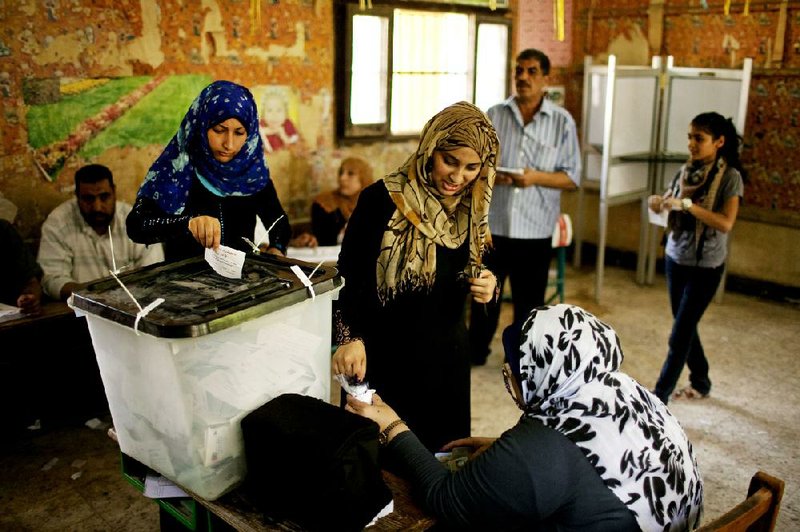CAIRO, Egypt — Egyptians lined up Saturday to pick the first president since the ouster of Hosni Mubarak, choosing between a standard-bearer of the old secular autocracy and a veteran of its Islamist opposition, even as a power grab by Egypt’s ruling generals ended the hope that the vote would complete Egypt’s transition to democracy.
Voters faced a choice between Ahmed Shafiq, a former air force general and Mubarak stalwart who promised to restore order and thwart the rise of an Islamist theocracy, or Mohamed Morsi, a veteran of the once-outlawed Muslim Brotherhood campaigning as a defender of the revolution against a return of the old order.
The ruling military council that took power after Mubarak’s ouster 16 months ago had pledged that this weekend’s two-day presidential runoff would be the final step in the transition to civilian government, the moment they would hand power to the first democratically elected leader in Egypt’s long history.
But the day before the vote, the generals shut down the democratically elected and Islamist-led parliament, acting on a ruling rushed out by a court of Mubarakappointed judges. They declared they would be the sole lawmakers, even after a new president is elected.And they began drawing up a new interim constitution that would define the power of the president whom voters were choosing Saturday.
“This is the end stage of the whole transition,” said Mahmoud Ismail, 27, a political activist in the town of Menoufia. “To be or not to be.”
The generals’ moves abruptly changed the stakes in the presidential race.
If Morsi wins, he will face a prolonged struggle for power against the generals, while Shafiq - who for at least a decade had been considered Mubarak’s likely successor - could emerge as a new military-backed strongman unrestrained by either a constitution or parliament.
Shafiq, Mubarak’s last prime minister, has made no public comment on the dissolution of parliament. He cast his ballot Saturday in the style of his former boss, arriving at a polling place in an upscale suburb surrounded by a heavy guard of military and police officers. The lines were pushed aside and guards immediately closed the facility for his private use.
Crowds of his supporters were waiting inside and outside the polling place. “The Brotherhood is dissolved,” they chanted, cheering at the dissolution of the Brotherhood-led parliament.
Morsi has cast the election as the last chance to beat back the full return of the Mubarak autocracy. He waited in line in the nearly 100-degree heat Saturday to cast his vote in the Nile Delta town of Zagazig where he used to teach engineering. “God is great,” a throng of supporters cried as he emerged, and he shouted over them to salute those killed demonstrating against Mubarak.
“Today is the day of the martyrs,” he declared. “There is no place at all for Mubarak’s helpers.”
Each candidate revved up a battle-tested political machine. Morsi turned to the Brotherhood’s system of local cells and charities built over 84 years of preaching and politics. Shafiq, who surged to roughly tie Morsi in the first round of voting, scarcely a month after he announced his campaign, relied instead on the network of local power brokers who had made up Mubarak’s defunct ruling party.
In Shafiq’s campaign offices in Menoufia, in the Delta province, operatives of the old ruling party said Saturday that they were enjoying the fun of Egypt’s first competitive presidential race. “This is a good feeling, if you don’t know what will happen,” said Tarek al-Warraqui, a campaign staff member who previously worked as a press officer for the local government. “Before, we know.”
He mocked the Brotherhood’s missteps and bragged about his colleagues’ proficiency in the bare-knuckle politics of the district.
“We have a network,” he said. “We have someone in every village. The Brotherhood’s experience is different,” he said. “We worked in the light. They were underground.”
He displayed fliers he had printed up and distributed throughout the district calling the Brotherhood members liars, associating them with U.S. officials, and, improbably, portraying them as disgraced members of the former government.
It was an extension of a campaign of bold inversions that Shafiq himself has leveled against the group. In reality, many of the Brotherhood’s leaders endured jail sentences and some of its activists were tortured because of their opposition to Mubarak’s rule. During last year’s revolt, its cadres were a mainstay of the protests in Tahrir Square.
Playing off the signs that the military-led government was determined to hold back their ascent to power, Brotherhood leaders held several news conferences to accuse Shafiq and his supporters of various schemes of electoral fraud like those practiced by the former ruling party, although none could be readily proved.
Morsi and Brotherhood leaders around the country, in turn, used the allegations to urge their supporters to get to the polls in large enough numbers to thwart any attempts to distort the vote.
After voting, Morsi huddled late Saturday to plot a response to the military’s dissolution of parliament, previously the base of their power. Acknowledging for the first time that the parliament had been shuttered, the Brotherhood demanded a national referendum on its legal status. “The military has no right,” it said.
“Remember the blood of the martyrs and the pain of the wounded,” the Brotherhood said in a statement. “Don’t in any way allow for the return of the tyrant former regime, that has always despised the Egyptian people.” Information for this article was contributed by Mayy El Sheikh, Dina Salah Amer and Liam Stack of The New York Times.
Front Section, Pages 9 on 06/17/2012

